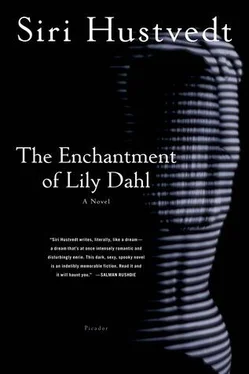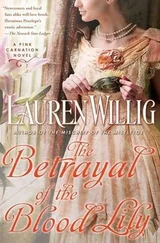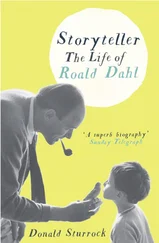Division Street was empty and just beginning to turn gray with the dawn. She walked halfway across it and stopped. She looked past Berman’s and Tiny’s and Willy’s Shoe Repair to the Ben Franklin on the corner and told herself to remember exactly how the street looked on this Friday morning, June seventh, the summer after she turned nineteen years old. Then she headed across the pavement, and the same instant her left foot touched the curb, Lily saw the lights in the Ideal Cafe go on.
* * *
At five twenty-five, Martin Petersen pressed his face against the cafe window. Lily was certain of the time. She had just glanced up at the minute hand on the clock because Vince wanted the cafe doors opened “on the dot.” Martin’s nose was flattened snoutlike on the pane, and Lily would have laughed at him if he had appeared any less suddenly. But no sound had preceded his arrival — no engine in the street or feet slapping the pavement. Part of setting up for breakfast in the cafe was listening to Webster’s early-morning noises, and when she turned her head and saw Martin, dressed in the same clothes he had worn the night before, she jumped.
He motioned to her.
Lily unlocked the door and spoke to him through the screen. “What are you doing here so early?” she said.
Martin walked toward the door and held out a piece of paper. “I–I-I,” he stammered, “brought you a map.”
“What for?”
“To, to get to my house.”
Lily waved her hands at the sides of her face. “Martin Petersen,” she said in the voice of an aggravated schoolteacher. “I know where you live. My parents’ old house is a quarter of a mile away, and I lived in that house for seventeen years.”
Martin walked up the single step and pushed his face into the screen. It made a dull pop as he increased the pressure, pushing his forehead, mouth and chin against the wire netting as if he wanted to burst it.
Looking at Martin, she saw that the tiny crosshatch pattern of the screen was etching itself into the skin of his face, and she also saw that he didn’t care. Stubborn, determined and blind, Martin refused to follow the rules that came automatically to most people, and Lily felt an urge to plow her fist straight into that big, white face that distorted the shape of the screen. Behind Martin she saw Pete Lund stepping out of his blue Ford.
“Cut it out!” she whispered to Martin. “You’ll break it.”
Lily unlatched the screen door, let Martin inside and held the door for Pete, who nodded at her.
After Martin had looked around the cafe suspiciously, like a kid playing Cold War spy, he handed Lily a little square of folded paper. He stuck his now-checkered face close to hers and whispered, “S-s-say it again.”
Lily stepped back and shook her head. She could feel the edge of the folded paper cutting into her palm.
Vince spoke from behind her, his voice commanding but not yet angry. “A customer, Lil’.”
“Coming,” Lily said.
“Say it again,” Martin was whispering.
“Dollface!”
“I’m coming, Vince.” Lily looked behind her. Vince looked redder than usual. She turned back to Martin. His eyes were enormous, blue and desperate. She didn’t want to look at those eyes anymore. She hated that mooning, pleading face and wanted it to vanish. “Mouth,” she said. Then she said it again more loudly, “Mouth.” She leaned toward him and growled, “Mouth! Okay?”
Martin smiled. Lily thought it was the smile of a drunk — loose-lipped and giddy. She turned away from him and walked toward Vince.
“Is that a customer or not?” he barked at her, pointing at Pete Lund.
“Relax, Vince,” Lily said. She glanced at the clock. “It’s five thirty-four.” Pete Lund was quietly reading the Chronicle. “Does he look upset? Is he demanding my attention? You know what he wants to eat. I don’t even have to take his order. Go in the damned kitchen and cook it. I know you. You’re mad about something else. Probably Boom. Is he still living with you? He doesn’t want to go back to his mom, does he?”
The man folded his arms across his chest and stared at her. “How come I hired the only two girls in this little shit-hole town who talk back?”
“Because you hate wimps, Vince, that’s why. And sensitive types quit on you. Remember Cindy? She ran out of here bawling after three days.”
“Aw, get off it, that little broad couldn’t take a joke.”
“Come on, Vince, that wasn’t a joke. It was a filthy, disgusting story, and you told it to shock her.” Lily smiled. “Is Boomer driving you nuts?”
“That kid doesn’t know whether he’s coming or going. I’d throw him out if it weren’t for that goddamned woman.”
“What’s her problem?”
“When he’s with her, she doesn’t want him, but when he’s not there, she does.”
“So she doesn’t,” Lily said.
Vince shook his head. “And he can’t stay away. He’s like a lush sneaking a drink. She kicked him out, but he won’t blame her, takes it out on the husband — not that he ain’t a first-class sleazeball.” Vince paused. “What was that all about?” He pointed with his thumb at the door.
Lily looked at Vince. “I don’t know,” she said, and she meant it. “He’s beginning to get on my nerves, but what it’s all about, I couldn’t tell you.”
After serving her first four customers, Lily took a break behind the counter and pulled the map out of her pocket. One glance told her that whatever Martin might have said about “directions” to his house, he had something much more complicated in mind. When she looked more closely, she saw that what Martin had given her wasn’t a map so much as a drawing representing two unfolded maps, complete with creases where the imaginary, not the real, paper had been folded. The maps had been drawn in such a way as to give an illusion of depth, as if one transparent map were floating on top of the other. The uppermost map showed Webster and the area around it and the map below showed Athens and the fairy wood from the play. Division Street was boldly labeled, as were the Ideal Cafe and the Stuart Hotel, but no stores. Beyond the town she saw the Bodler place, Heath Creek, Heath Woods, the Jesse James Caves, and up in the far right-hand corner Martin had drawn an arrow and written “To your Dahl Grandparents.” Not far away from the arrow was the Overland farm marked with a large star and a drawing of an oblong box or chest. Her grandparents were both dead, and there was nothing left of their farm, so the notation struck her as odd. The Overland place was still there, only minutes from where her grandparents had lived, but she hadn’t thought of it for a long time. She had never laid eyes on the children who lived upstairs in that house, and she tried to remember what was wrong with them. They couldn’t speak. Her grandmother had told her the two girls rocked back and forth for hours and hours, each in a corner. But what did that box mean? The drawing irritated her. She sensed Martin was speaking to her again in that roundabout way of his, hinting at things she couldn’t grasp. And then, right before she lifted her eyes from the paper, she noticed that around the edge of both maps, Martin had written the word “Sleep.” Lily puzzled over it for a couple of seconds, looked up at the red booths and then over at Clarence Sogn’s sunburnt head, and wished she hadn’t said the word for Martin. It had been wrong to say it, but why? It was because he had looked so satisfied. When she remembered it, she felt sick.
Around twelve-thirty, just before her shift ended, Lily cut two pieces of lemon meringue pie for the old Moss sisters.
“It’s hives, dear,” Leonora said. “I’ve had them a hundred times. It’s that new detergent you used on the sheets.”
Читать дальше












